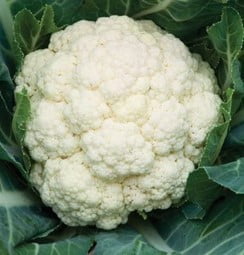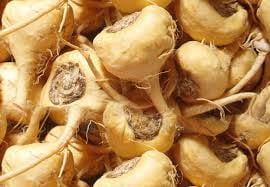For decades, scientists have known that phytonutrients in many healthful foods work as antioxidants to disarm free radicals before they can damage DNA and cell membranes. Recent research indicates that the phytonutrients in vegetables like kale work at a much deeper level, signaling our genes to increase production of enzymes involved in detoxification, the cleansing process by which the body eliminates harmful compounds.
Health-promoting phytonutrients in kale have been gaining attention for their powerful effects in combating cancer as well as their beneficial effects on both heart and eye health.
Kale is a rich source of organosulfur compounds, which have been shown to reduce the risk of many cancers,1 especially one of the most deadly forms, colon cancer.2 The cancer-protective compounds in kale have thus been the subject of intense research, particularly their role in blocking the growth of cancer cells and inducing cancer cell death (apoptosis).
Organosulfur compounds known as glucosinolates are present in the cruciferous vegetables of the Brassica genus. These compounds are broken down into potent anticancer compounds called isothiocyanates in the body, which are powerful inducers of cancer-destroying enzymes and inhibitors of carcinogenesis.3 Now, scientists have found that sulforaphane, a glucosinolate formed when kale is chopped or chewed, works by altering gene expression, helping to clear carcinogenic substances from the body more quickly. It is believed that sulforaphane triggers the liver to produce detoxification enzymes called phase II enzymes, which help neutralize cancer-causing substances.4-6 Such beneficial enzymes induced by kale and other cruciferous vegetables include quinone reductase4 and glutathione-S-transferase.5 In experimental studies of cancer formation, quinone reductase has been shown to dose-dependently inhibit the growth of cancer cells.4 Meanwhile, in a study of patients with lung cancer, a high intake of cruciferous vegetables has been found to reduce the risk of lung cancer by 39% only in those with a beneficial variant of the gene called GSTM1. This gene produces the enzyme glutathione-S-transferase, which detoxifies carcinogens in tobacco smoke.5
Other studies reveal that sulforaphane helps support a healthy immune system, which is a key component in staving off cancer. Sulforaphane has been found to significantly enhance the production of several chemicals that are involved in the immune response, such as interleukin-2 and interferon-gamma.7
In other research, sulforaphane has been shown to have a more direct effect on cancer prevention, especially in colon cancer, inducing cancer cells to destroy themselves. This was seen in a recent study in which animals were genetically bred to develop intestinal polyps, a condition that leads to tumor formation. This group of animals was then fed sulforaphane and found to have higher rates of apoptosis (cell suicide) and smaller tumors that also grew more slowly than animals who received no sulforaphane.8
In addition to organosulfur compounds, kale has for years been vaunted for its wealth of carotenoids—natural plant pigments that absorb blue light. Kale is especially abundant in two carotenoids, lutein and zeaxanthin, both of which act like sunglass filters and help prevent damage to the eyes from excessive exposure to ultraviolet light. In several studies, people with a history of eating lutein-rich foods like kale had up to 22% lower risk for cataracts, which would otherwise have been severe enough to require extraction.9,10
The benefits of lutein also extend to prevention of atherosclerosis. An 18-month study from the University of Southern California found that in a group of 480 men and women aged 40 to 60 with no history of heart disease, those with the lowest serum lutein concentration had a five-fold greater increase in carotid artery thickness, a risk factor for heart disease, compared with those who had the highest serum lutein concentrations. This study also included an in-vitro portion, which compared tissue cultures of cells exposed to various combinations of lutein and detrimental, low-density lipoprotein (LDL), which is known to promote atherosclerosis. The researchers found that pretreatment of cells with lutein dose-dependently protected the cells against inflammation associated with LDL plaque formation, again confirming lutein’s protective effect against atherosclerosis.11
Another prime benefit of kale is its high nutrient content. Kale is a very good source of dietary fiber, calcium, manganese, copper, and potassium, as well as being particularly rich in vitamins A, C, and B6. One cup of kale contains just 33 calories, but provides over 200% of the daily recommended intake of vitamin A, an important nutrient for vision. Kale is also especially noteworthy for its high content of vitamin K, a fat-soluble vitamin that plays an important role in blood clotting.12,13
Kale can be found in markets throughout the year. To get the most health benefit, be sure to choose organically grown kale, and steam lightly. This method of cooking retains the most phytonutrients, and also maximizes their availability within the body. Those who find it difficult to consume enough cruciferous vegetables in their daily diet can obtain standardized potencies of sulforaphane, along with zeaxanthin and lutein in low-cost dietary supplements.
*** We have Sulforaphane. Just copy & paste Sulforaphane in the search box. *** Bob G.
*These statements have not been evaluated by the Food and Drug Administration. These products are not intended to diagnose, treat, cure or prevent any disease.











Reviews (0)
There are no reviews yet.